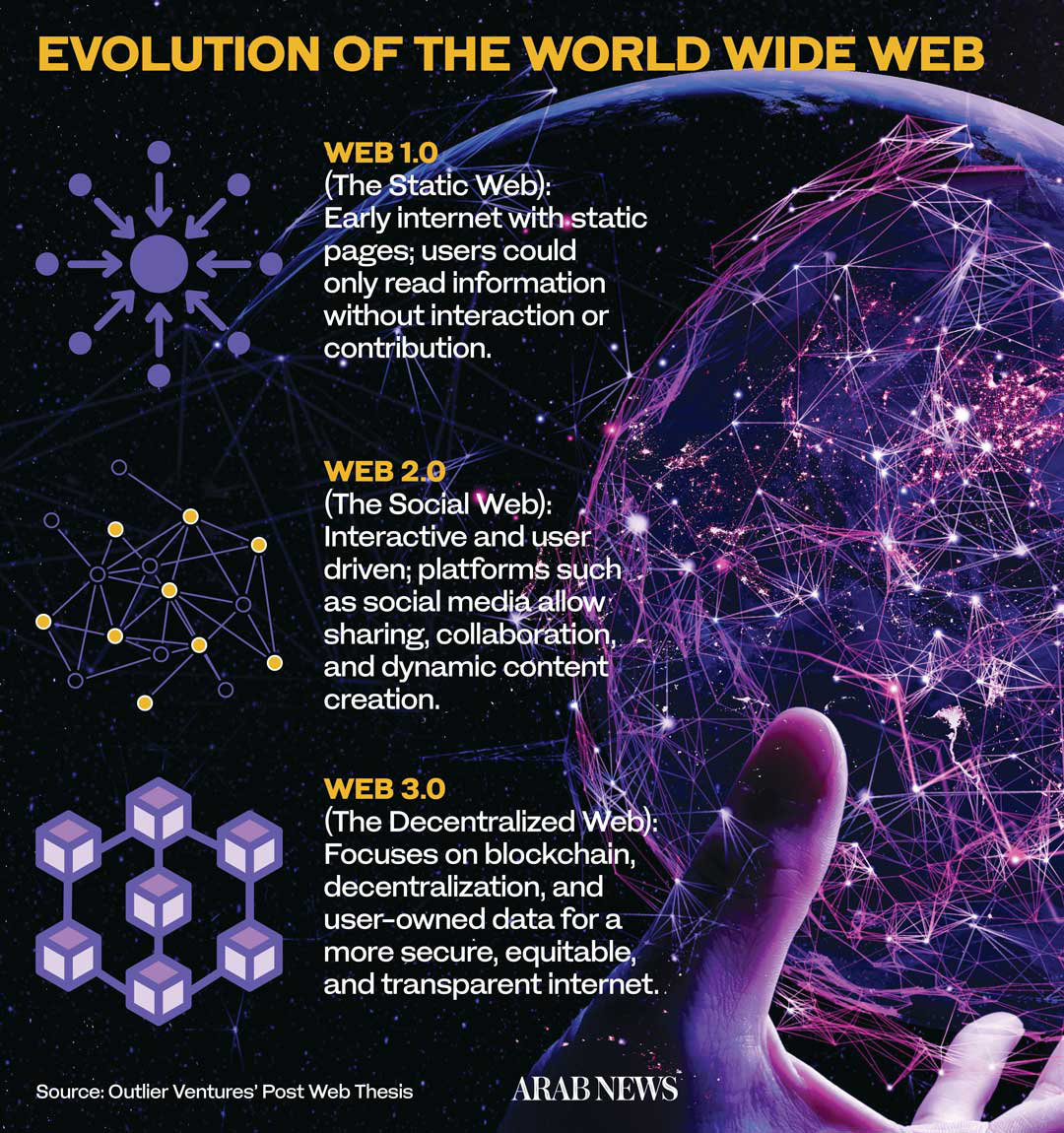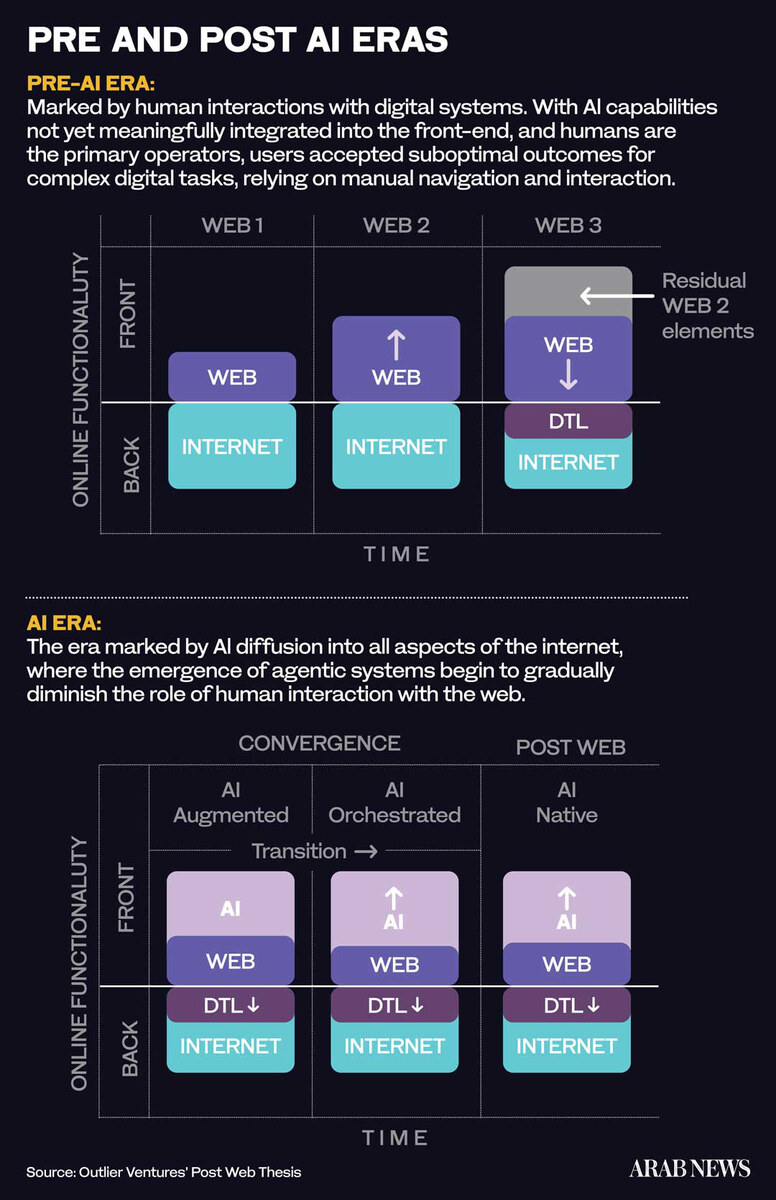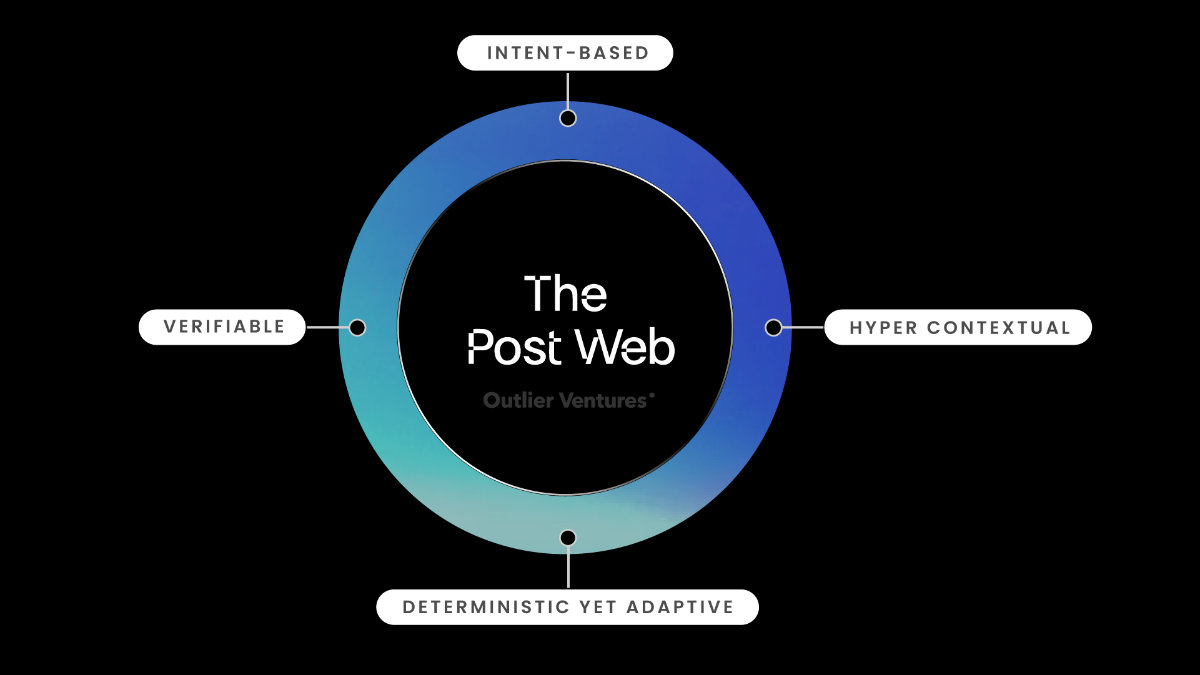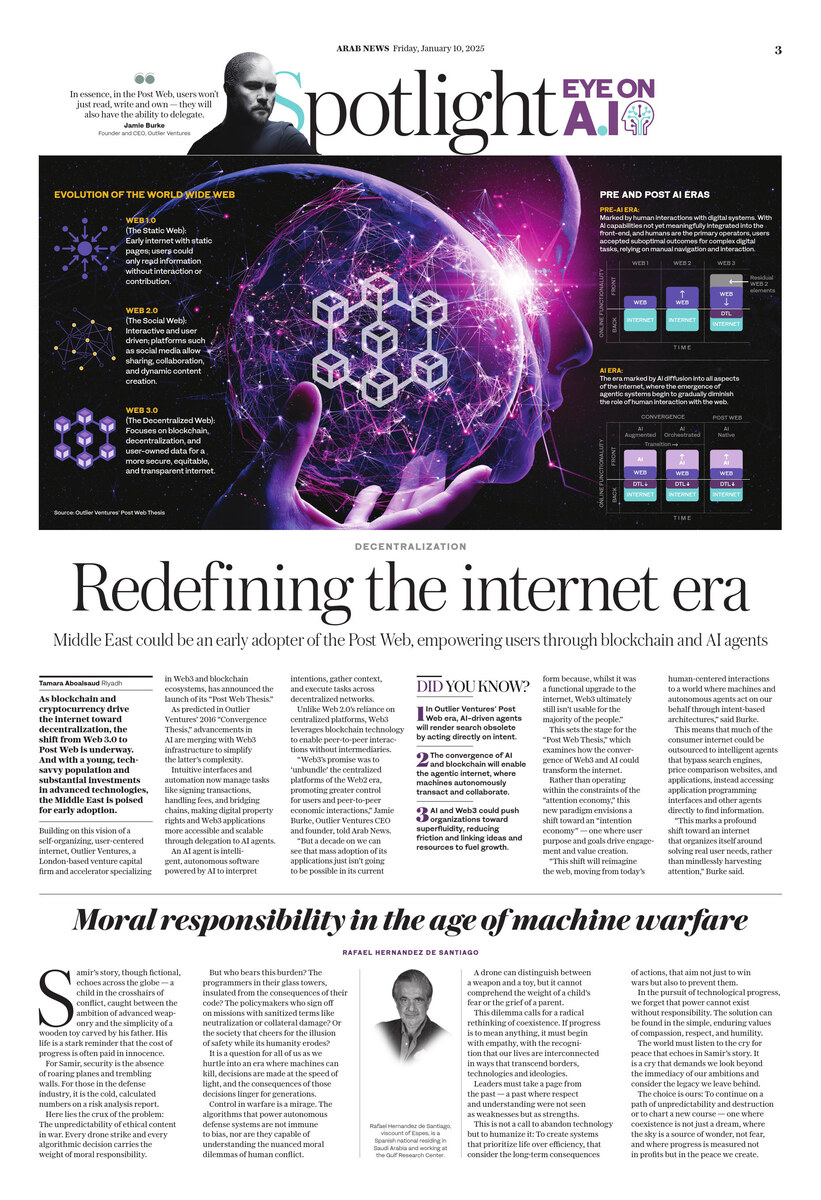RIYADH: As blockchain and cryptocurrency drive the internet toward decentralization, the shift from Web 3.0 to Post Web is underway. And with a young, tech-savvy population and substantial investments in advanced technologies, the Middle East is poised for early adoption.
Building on this vision of a self-organizing, user-centered internet, Outlier Ventures, a London-based venture capital firm and accelerator specializing in Web3 and blockchain ecosystems, has announced the launch of its “Post Web Thesis.”
As predicted in Outlier Ventures’ 2016 “Convergence Thesis,” advancements in AI are merging with Web3 infrastructure to simplify the latter’s complexity.
Intuitive interfaces and automation now manage tasks like signing transactions, handling fees and bridging chains, making digital property rights and Web3 applications — or decentralized apps — more accessible and scalable through delegation.

“AI agents can now serve users by acting on their intent with a blend of deterministic precision and adaptive flexibility through hyper-contextual experiences,” Jamie Burke, Outlier Ventures founder and Chairman, told Arab News.
“In essence, in the Post Web, users won’t just read, write and own — they will also have the ability to delegate.”
An AI agent, Burke says, is intelligent, autonomous software powered by AI to interpret intentions, gather context and execute tasks across decentralized networks, either independently or on behalf of users, with varying degrees of sovereignty.
Those agents will initially handle simple tasks, such as booking appointments, but can gain economic agency over time by interacting with distributed ledger technology such as blockchain, enabling users to perform tasks without a centralized authority.
Burke highlighted the Middle East and North Africa region as a prime candidate for early adoption of the Post Web, citing its young, tech-savvy population and significant investments in advanced technologies.
The region’s advantages could position it as a global hub for Post Web innovation and development, he said.
Opinion
This section contains relevant reference points, placed in (Opinion field)
Web3 defines the web’s “read-write-own” era. Its original goal was to create a decentralized internet using blockchain technology, giving users digital property rights and greater control over their data and assets.
Unlike Web 2.0’s reliance on centralized platforms, Web3, the latest evolution of the World Wide Web since Tim Berners-Lee’s creation in 1989, leverages blockchain technology to enable peer-to-peer interactions without intermediaries.
“Web3’s promise was to ‘unbundle’ the centralized platforms of the Web2 era, promoting greater control for users and peer-to-peer economic interactions,” Burke said.
“But a decade on we can see that mass adoption of its applications just isn’t going to be possible in its current form because, whilst it was a functional upgrade to the internet, Web3 ultimately still isn’t usable for the majority of the people.”

This sets the stage for the “Post Web Thesis,” which examines how the convergence of Web3 and AI could transform the internet.
Rather than operating within the constraints of the “attention economy,” this new paradigm envisions a shift toward an “intention economy” — one where user purpose and goals drive engagement and value creation.
“This shift will reimagine the web, moving from today’s human-centered interactions to a world where machines and autonomous agents act on our behalf through intent-based architectures,” said Burke.
This means that, in the near future, much of the consumer internet could be outsourced to intelligent agents that bypass search engines, price comparison websites and applications, instead accessing application programming interfaces and other agents directly to find information and compare services.
The Post Web’s intention economy seeks to prioritize users’ needs by seamlessly aligning their goals with counterparties through contextual, dynamic interfaces. This approach enables more valuable interactions while minimizing waste and reducing exploitation.
“This marks a profound shift toward an internet that organizes itself around solving real user needs, rather than mindlessly harvesting attention,” Burke said.
“We still believe that humans will interact with the web, but rather than spending hours searching for the best insurance for example or flights for a holiday, time will be spent with much more enriching engagements that people enjoy doing social, gaming and immersive shopping.”

And as AI agents handle most transactional activities and routine tasks in the background, the traditional web will largely fade away, making room for the “Thin Web.”
Inspired by Maslow’s hierarchy of needs, this streamlined web offers varying levels of immersion based on users’ personal and environmental contexts.
A simple example of how the Post Web will transform online experiences is booking a family holiday.
Traditional websites are often cluttered with ads for packages that do not fully meet a family’s needs, forcing users to make rushed or suboptimal decisions. Search engines, driven by optimization practices, frequently prioritize results based on rankings rather than quality.
“Paid advertisements and manipulation of organic rankings through search optimization often overwhelm users,” Burke said.
“While price comparison websites may seem like an alternative, these platforms also complicate matters. They typically prioritize results based on auction placements, and comparisons are rarely like-for-like.”
If a user is purchasing holiday insurance for a family with diverse ages and interests, a basic plan might not cover an advanced scuba diver, a beginner and another child who prefers surfing.
The more multidimensional and diverse the trip, the more complex and time-consuming the planning becomes.
In an intention economy, an AI agent compares policies across multiple dimensions, such as payout structures, activity-specific coverage and unique risk factors, Burke said.
“For example, they could recommend a product tailored to a family with an experienced scuba diver and novice scuba diver, factoring in skill level, diving conditions based on weather reports, and other nuances to ensure optimal coverage.”
In terms of cost-effectiveness, Burke says the Post Web eliminates inefficiencies in the consumer internet and “software as a service” sectors. It removes unnecessary intermediaries and aligns outcomes with user needs, resulting in faster, cheaper and better solutions.
DID YOUKNOW?
• In Outlier Ventures’ Post Web era, AI-driven agents will render search obsolete by acting directly on intent.
• The convergence of AI and blockchain will enable the agentic internet, where machines autonomously transact and collaborate.
• AI and Web3 could push organizations toward superfluidity, reducing friction and linking ideas and resources to fuel growth.
By enabling sellers to reach users without relying on interruptive advertising, it reduces costs for both buyers and sellers.
AI agents optimize the technology stack — compute, storage and networking — and replace inefficient centralized cloud systems. This benefits users and sellers but is a major loss for platforms profiting from the attention economy.
In addition to being a more cost-effective solution, the Post Web will lead to what Burke calls a “Supercycle.”
Burke believes these technologies will drive widespread adoption, bringing billions of users and real-world assets on-chain. This presents a valuable investment opportunity in digital assets, which will become crucial for powering the internet and its virtual supply chains.

Since these assets will reflect real-world supply and demand, they can be analyzed like traditional commodities, paving the way for billions in institutional and retail investments through exchange-traded funds and stock market indexes.
“It’s important to see the transition into the Post Web as a vision that will evolve and adapt over time,” he said.
“Web3 was first introduced 10 years ago and while we are sharing our vision for the Post Web now, we see this as an evolution that will evolve over the next 10 years.
“During this time the web as we know it will continue to evolve as AI agents manage more and more tasks on users’ behalf, and the most relevant technologies will converge into the Post Web, but others will become obsolete such as the app store and search.”
































